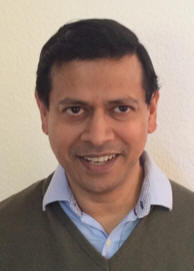Catholic Medical Quarterly Volume 74(3) Aug 2024
Editorial
Reflections on the Synod on Synodality
Dr Pravin Thevasathan
 A picture is indeed worth a thousand words. The picture I have in mind
is that of a smiling Pope Francis next to an obviously delighted Sister
Jeanine Gramick. She had even found a religious habit from somewhere. She
is known not only for her dissent from Church teaching on homosexuality
but for her support for President Obama's campaign to promote global
abortion. She is the founder of "New Ways Ministry" and its purpose was to
look at Church teaching in a new way, a way that then-Cardinal Ratzinger
found to be completely contrary to Church teaching.
A picture is indeed worth a thousand words. The picture I have in mind
is that of a smiling Pope Francis next to an obviously delighted Sister
Jeanine Gramick. She had even found a religious habit from somewhere. She
is known not only for her dissent from Church teaching on homosexuality
but for her support for President Obama's campaign to promote global
abortion. She is the founder of "New Ways Ministry" and its purpose was to
look at Church teaching in a new way, a way that then-Cardinal Ratzinger
found to be completely contrary to Church teaching.
Following the completion of the first phase of the Synod on Synodality, we are called to live our faith in a new way. There is nothing wrong with that, providing it does not contradict the old way. Or, as Sister Gramick puts it, the "old Church!" The only problem with this is that so many of those who took part in the synod have very little time for the old Church.
Cardinal Jean-Claude Hollerich, the synod's relator general, has said that Church teaching on homosexuality is "no longer correct." Sister Nathalie Becquart, undersecretary of the Synod of Bishops, gave an entirely supportive address to Sister Gramick's New Ways Ministry. Jesuit Giacomo Costa, head of the synthesising task force, lent support to an Italian bill that would have mandated Catholic schools to support homosexual activists. Among the synod experts are Monsignor Philippe Bordeyne, who dissents from the moral teachings of the Catholic Church. Another expert, Austen Ivereigh, has praised the synod as "the greatest ever exercise in listening." But have the experts listened to orthodox Catholics or Catholics who "breed like rabbits"?
Students of Church history will know that certain historical events have been used to challenge the teachings of the Catholic Church. They include the Crusades, the Inquisition, and the Galileo case. Cardinal Schonborn has come up with a new one: the death penalty. He argues that if Pope Francis can change Church teachings on the death penalty, he can do so on LGBT issues. To be fair to Pope Francis, he did not formally change Church teachings. He has said that the death penalty ought to be regarded as inadmissible, a somewhat ambiguous term. He did not state that it is intrinsically evil. Unfortunately, Pope Francis himself said that the Church has changed its teachings on slavery. It has not. From its very beginning, the Church has consistently fought to bring down this institution. It succeeded in doing so. Interestingly, Father Charles Curran used the issue of slavery to explain his dissent from Church teaching.
Actually, we have much to learn from the Galileo case and from the Inquisition. Our Church leaders should not claim expertise on matters of science. On climate change, for instance. Nor should they set about punishing Catholics who belong to the "old Church." Which actually happens to be the new Church, the one Church. We are called to listen to the Holy Spirit. The Holy Spirit teaches us with certainty that the Catholic Church cannot change its teachings on matters of faith and morals.
References
- Congregation for the Doctrine of Faith (1999), Notification
regarding Sister Jeaninne Gramick and Father Robert Nugent, May
31,1999.
https://www.vatican.va/roman_curia/congregations/cfaith/documents/rc_con_cfaith_doc_19990531_gramick-nugent-notification_en.html - Edward Pentin (2024) "Who is managing the Synod on Synodality?" by
Edward Pentin, EWTN News, November22, 2022
https://ewtn.co.uk/article-who-is-managing-the-synod-on-synodality/
